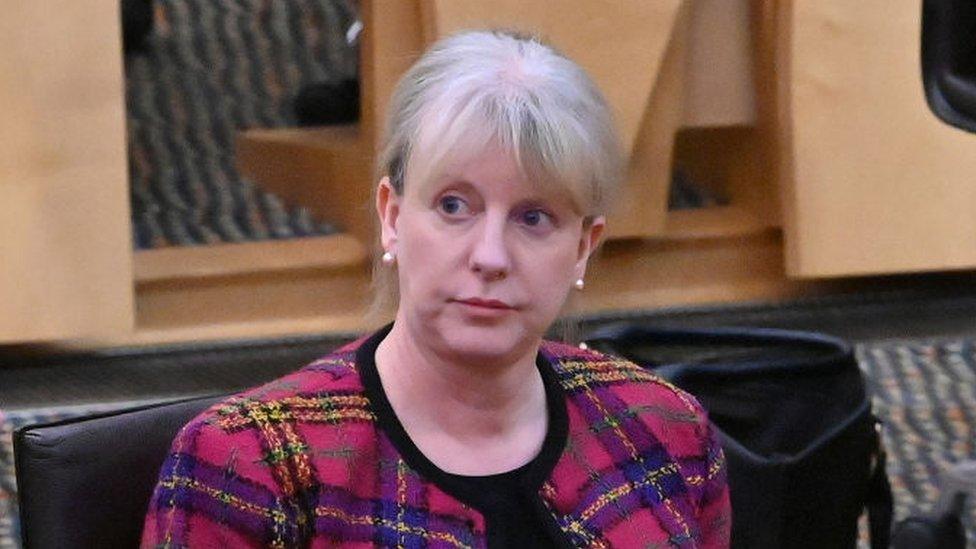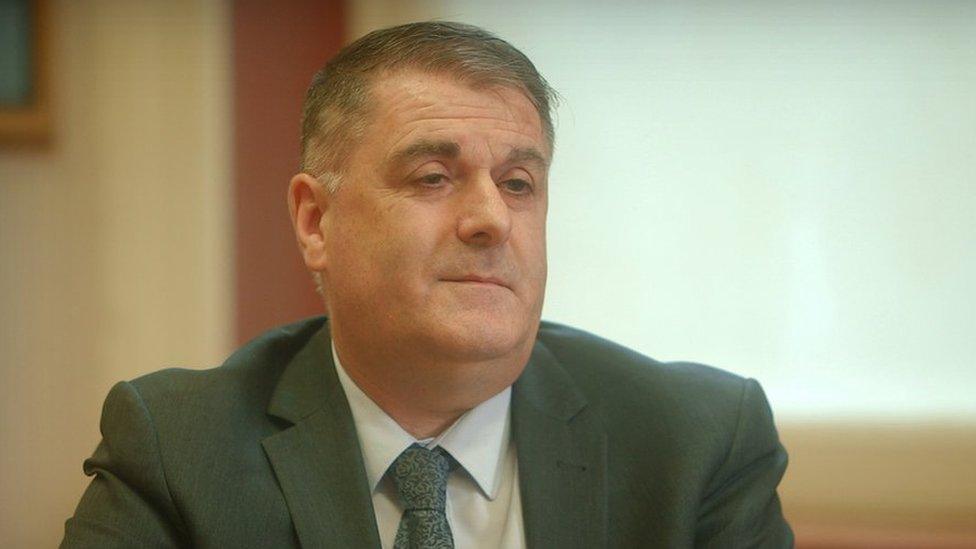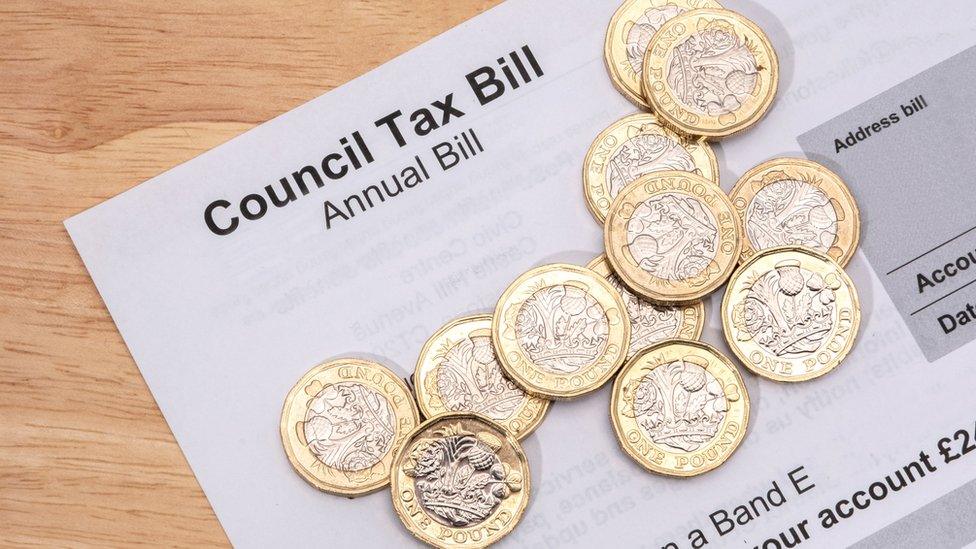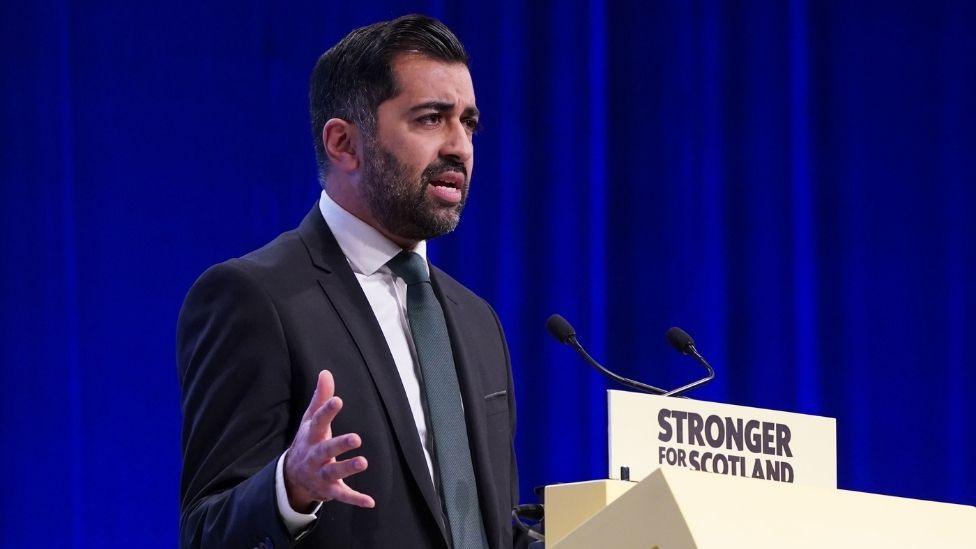Cosla declares 'dispute' with ministers over funds
- Published

Shona Robison said the government had been fair with Cosla
Council leaders have called for an urgent meeting with the first minister, saying they are in "fundamental dispute" over funding.
They want to discuss the Verity House Agreement which sets out how councils and the government relate.
Cosla said relations had broken down over issues including the council tax freeze and teacher numbers.
The deputy first minister said they were open to discussions but had to be fair to the rest of the public sector.
In a letter seen by BBC Scotland, the group said they were in a "fundamental position of dispute".
They also raised concerns around the "extremely disappointing tone and content of the letters" from members of the cabinet.
Stephen McCabe, the Labour leader of Inverclyde Council, said the Verity House Agreement, external was "dead in the water".
He told BBC Radio's Good Morning Scotland programme: "It all stems from the first minister's announcement of a council tax freeze without any consultation with local government - or anybody, it would seem.
"That has set the tone of the ongoing discussions between the government and local government and, increasingly over the last number of months, the government has become intransigent in a number of ways."
First Minister Humza Yousaf made the announcement during his closing speech at his party's conference in October.
However, Mr McCabe claimed the proposed council tax freeze was not fully funded by the Scottish government and so far the government had refused to have any "meaningful negotiations" around the dispute.
"Local government fundamentally opposes the principle of a council tax freeze because it should be up to local councils to set the council tax," he said.
"But the first minister said he would negotiate the council tax freeze with Cosla and it would be fully funded.
"It is not fully funded and there have been no negotiations. There have been lots of discussions but no negotiations.
"The Scottish government basically has not moved: it's a 'take it or leave it'. Some councils will ultimately take it and there may well be other councils who will leave it."

Inverclyde council leader Stephen McCabe criticised the proposed council tax freeze
He said Cosla had recently made a counter offer to the Scottish government of a council tax cap of up to 5% in return for the money set aside for the freeze, but so far the Scottish government had rejected it.
He also criticised the "dismissive, threatening nature of some of the correspondence".
"The Scottish government is prepared to put income tax up to protect public services, but they want council to freeze council tax," he said.
"And the consequence of freezing council tax will be cuts to services. And we've been cutting services for 17 years."
He said council tax freeze would be a "regressive" policy.
'Reasonable and fair'
Deputy First Minister Shona Robison, who is also the finance secretary, said the Scottish government has provided £147m to keep a council tax freeze equivalent to 5% and £145m to maintain teacher numbers.
She said the public sector was financially challenged and it was important to be fair to the entire sector while still prioritising the most important areas.
Ms Robison said: "We will continue to discuss with Cosla where there are areas of further compromise but it has to be reasonable and it has to be fair to the rest of the public sector.
"It has to be fair to council tax payers and it has to be fair to parents who expect teachers in the classroom.
"We have to take a step back from the politics and actually look at how we can reach a compromise."
She said it was ultimately for councils to decide, but they could not have the money to fund a council tax freeze if they chose not the freeze it.
But she claimed Cosla had demanded money for the council tax freeze as well as "a number of other asks which isn't a very reasonable negotiating position."
Ms Robison said the government had met with Cosla almost every week and would meet again next week.


Relations between many councils and the Scottish government have never been so strained.
Yet only months ago there was hope that the relationship was entering a positive new era.
In June 2023 the Verity House Agreement set out how the two sides would work together on shared priorities.
The tension comes down to money - councils are hugely dependent on the Scottish government for cash.
The unexpected announcement of a new council tax freeze by the first minister at the SNP conference annoyed, even angered, some local authorities.
The sudden manner in which the freeze was announced was, they felt, against the spirit of the agreement.
Many councils also argue the amount they are being offered by the government to freeze council tax is insufficient.
Councils are now mulling over their budgets for the coming year and will be setting them over the next few weeks.
Will they lead to new cuts or rises in charges which exceed inflation?
Or will some councils actually put up the council tax? A few are contemplating this option but it does not automatically follow that they will.
Any rise would need to be significant to be meaningful. First, it would need to raise enough to balance out the money they would have got from the government to freeze it. Only then might a rise generate cash for council coffers.
How would voters react to a significant rise in the council tax? Although inflation has fallen, many households are still dealing with the cost of living crisis.
Opponents of a further freeze question whether it is really progressive.
They claim that better off people will generally gain the most from a council tax freeze but the poorest would suffer from more cuts to council services.
Difficult choices lie ahead in the coming weeks.

Related topics
- Published4 December 2023

- Published17 October 2023
